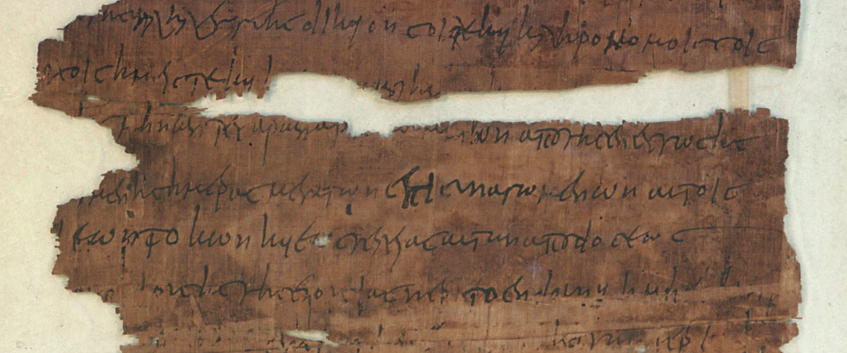Glossary
This glossary is a result of the first phase of the project, after the team has translated into English and coded the legal documents from the archives of Aphrodite in preparation for further analysis. During this process we encountered a number of difficulties in our effort to keep the translations as comprehensible and grammatically correct as possible, and at the same time searchable through the tool designed for network analysis. We decided to create a dictionary in order to facilitate our task of translating a large group of texts and for these texts to be both accurate and consistent in regards to the terminology applied. As our dictionary was starting to develop shape and form, we decided to share it on our website, inviting colleagues to contribute with their expertise and welcome any feedback.
The glossary, still very much a work in progress, consists of two main parts. The first part is a narrative summary of the structure, the language and the wording that each discussed group of documents shares. For each category, we provide a list of all possible clauses and elements, together with short discussions.
The second part is the glossary itself. It lists words and expressions used in the documents and provides a fitting translation, which has become a point of reference to the team’s translations in order to maintain consistency. It includes common words used in the Archive’s documents, Latin words, hapax, and other words of particular interest.
Since a certain word often has various meanings in different contexts, even in the relatively uniform milieu of legal texts belonging to a single archive, Part A is divided into sub-sections, each encompassing one type of legal device, such as leases, sales, divorces etc. So far, it is based solely on the more common types of legal devices, namely leases, sales, petitions and official dealings, marriages and divorces while those attested once, such as a manumission, or a few times, especially in fragmentary states, such as wills, have not been yet included. We have made this distinction on a case-by-case basis. Yet, certain expressions, such as witnesses’ subscriptions, kyria clauses etc. share exactly the same meaning among different document types. These are collected in a separate section.
Credit for the glossary is due to Michael Konstantinou-Rizos, who was supported in this task by other members of the team, namely Witold Tokarski, Constantinos Balamoshev, Maria Nowak & Marzena Wojtczak.

Conferences & Workshops
August 28–30, 2024: M. Wojtczak, paper ‘Vulgarisation’ of law vs. textual datasets long before AI? Documentary patterns and languages in service of legal needs in late antique Egypt at INTERFACEing 2024 – From the Invention of Writing to the Emergence of Artificial Intelligence: Cultural Approaches to Information Technology, National Taiwan University, Taipei, Taiwan.
καὶ ὑπὲρ πίστεως καὶ σφαλείας τοῦ αὐτοῦ παρόντος χρέους
– Ηow to secure a debt in Αntiquity?’
22–24 September 2023, Ägyptologisches Seminar, Freie Universität Berlin
Real and personal securities are one of the most mundane phenomena encountered in private-law debt relations, yet characterised by an impressive wealth of possible legal solutions. Antiquity is in no way inferior to later eras in this aspect. The dogmatic development of legal institutions for guaranteeing the repayment of incurred debt goes hand in hand with solutions (and inventions) encountered in everyday life. Personal guarantee, pledge, mortgage, transfer of ownership – these are the most intuitive forms of security for anyone familiar with the legal mindset (especially that ordered by Roman law). Papyri, ostraca, and other sources of legal practice, however, provide us with examples of legal devices that not only combine solutions known to the trained lawyers, but also build on pre-existing institutions (even those not originally intended for warranty purposes) to satisfy the interests of the contracting parties. How does this multifaceted image fit into various antique legal frameworks? How do we ensure that the solutions applied (these ad hoc as well the already-known ones that are finding new uses) are not only lawful but also provide effective protection? What can the sources tell us about the legal awareness of ordinary people? Is legal practice a testing ground for instruments already known to legal dogma, or can it provide a forge for new ideas and impetus for changes adopted in the law? In a world of interpenetrating cultures, relentless conquests and various legal orders functioning side by side, identifying sources of inspiration, potential influences or determining the independent (though sometimes parallel) formative processes of legal devices is only possible within an interconnected scholarly discourse. We will therefore strive to combine different fields of expertise and make the problems outlined above the focus of joint deliberations this autumn in Berlin!
Past conferences
21–22.04.2023: International workshop ‘Ancient Law in Context: Teaching and Education’, Edinburgh, Scotland; paper: ‘Learning by doing, or doing by learning? – legal devices in Dioskoros’s dossier’ (M.Wojtczak & J. Urbanik)
10–11.06.2022: International workshop ‘Women and Justice: Female Agency in Late Antique Legal Cultures’, Bonn, Germany; paper: ‘‘Weaker’ sex and ‘weaker’ dispute resolution? – Women & arbitration in late antique papyri’ (M.Wojtczak & J. Urbanik)
25–30.07.2022: XXXth International Congress of Papyrology, College de France, paper ‘How to make it legal? Social Networks & Legal Devices’ (M. Nowak & M. Wojtczak)
01–02.06.2022: International Conference “Già nell’antica Roma?”. Ovvero come il diritto romano non è sempre un modello, University of Warsaw, paper: ‘Social networks and legal devices: how to get things done in late antique Aphrodite?’ (M. Nowak & M. Wojtczak)
Courses
Constantinos Balamoshev (University of Warsaw, Faculty of Archeology): Dioskoros son of Apollos from the Egyptian village of Aphrodite and his adventures: headman, notary, poet (course for BA & MA students held in Polish)
Research & Study Stays
‘Texts and Their Landscape: International Winter School in the Papyrology and Archaeology of the Fayum’ in Fayum from 8–16 February 2025. This event was hosted by the Polish Centre of Mediterranean Archaeology Research Centre in Cairo and organised in cooperation with Law & Social Networks in Aphrodite project.